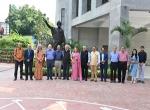The Vivekananda International Foundation organised a Virtual Book discussion on "Harnessing the Trade Winds: The Story of the Centuries‐Old Indian Trade with East Africa, using the Monsoon Winds" authored by Blanche Rocha D’souza on the 08th of November 2021. The event was chaired by Dr Sreeradha Datta, Centre Head & Senior Fellow, Neighbourhood Studies, VIF. The book discussion was followed with comments by a panel consisting of Ambassador Skand Ranjan Tayal, who has served at Indian missions in Geneva and Moscow, Ambassador Virendra Gupta, Former India’s High Commissioner in Tanzania, Trinidad & Tobago, South Africa, Ms. Ruchita Beri, Senior Research Associate and Coordinator, Africa, Latin America, Caribbean and United Nations at MP-IDSA, and Shri Samir Bhattacharya, Research Associate, VIF.
Ambassador Skand Ranjan Tayal began his presentation by stating that the book is an important contribution on identifying the role of the Indian diaspora in Africa. Amb Tayal highlighted that people of the Indian sub-continent have often been poor chroniclers of history, leading to the loss of valuable history in time. He stated that the author points out that the Indian traders who went to East Africa were illiterate yet very skilful in mental maths and account keeping. He mentioned that the book has about fifteen pages of valuable references, including archival texts, books, official records and gazettes, memoirs, etc, thereby reflecting an arduous and patient work put in by the author. Amb Tayal underlined the fact that the author convincingly establishes that trade existed between the West Indian and East African coast for centuries. Indian merchants dominated the trade until the Europeans' advent in the 17th century. The book also showcases how Zanzibar became a centre for the spice trade.
Amb Tayal also highlighted the harmonious relationship shared between the Indians and the Arab diaspora. Indian traders and financiers played a vital role in the rise of Zanzibar as a trade centre, but with the entry of Europeans into Zanzibar- the role of Indians in trade and administration was gradually reduced. He also commented about the Indian indentured labourers brought to Africa by the European colonialists. Commenting about the politics, he talked about the formation of the first Indian political organisation in Africa i.e. the Mombassa Indian Association in 1900 and the East African Indian national congress in 1914, perhaps inspired by the Indian political movements. Amb Tayal also mentioned about the fuelling of rifts between Indians and Africans by the Europeans to meet their interests. Concluding his remarks, he opined that the book fills a significant gap and explains the role of the Indian diaspora in Africa in trade and other sectors. But further research is required to substantiate analysis undertaken by the author.
Ambassador Virendra Gupta began his presentation by stating that the book was well researched and has highlighted the connection of the Indian diaspora with Africa. He added that the western writers and the Arabs have often downplayed India’s linkages with Africa. Amb Gupta talked about Tanganyika’s German colonisation and their appreciation towards Indians’ skill in their trade. This led to Indian emigration towards Tanganyika, and finally, in Tanganyika, over 95% of the trade was handled by Indians. He argued that the book has been written with good intentions for the Indians in Africa. Also, about the Indian experience with the European colonisers and their actions against Indians. Amb Gupta highlighted that Indians not only contributed to trade between India and Africa but also contributed immensely towards the socio-economic development of Africa. He also commented that the present status of Indians in Africa is a tribute to the values that their forefathers instilled in them.
Ms Ruchita Beri began her presentation by stating the marginalisation of India- Africa ties for a long time, and not much importance was given to relations with Africa until the recent decade. She added that there has been a substantive positive outlook towards Africa in this decade even as Prime Minister Modi declared the relationship with Africa a priority. Ms Beri stated that misinformation was spread by western writers saying that Arabs traded more substantially with Africa than Indians and about the development of Africa was done more by the Europeans. She underscored the fact that there were many cultural linkages between India and Africa in the ancient times, such as the connection with Ancient Africa through the Rig Veda and the Puranas. The book also adds that Indians preceded the European traders in Africa for a long time. Ms Beri argued that some of the assertions in the book need to be studied to verify the claims as there have been some adverse claims by European writers. In conclusion, she stated that the book is a must-read for people researching diaspora studies and Indo-Africa studies.
Shri Samir Bhattacharya began his presentation by stating that the book counters some mainstream history that revolved around upon the needs of the western rulers of those times. Arguments such as Hippalus, the Greek mariner was the first to discover the monsoon winds, and also the relationship with Africa began with Mahatma Gandhi's stay in Africa are untrue. He also added that the absence of academic record is due to fewer works that were done on these themes. Mr Bhattacharya argued that the critiques regarding the authenticity of certain portions can be quickly established, and we need to appreciate the author's work as it covers a period of more than 3000 years. He later elaborated on the chapter on Ugandan railways and about the Indian surveyors and workers who played an important role in building the railway line. Mr Bhattacharya highlighted that the book falls in post-colonial works as the book does not try to create an alternate history but directly complements the present one. He opined that this book will help in the creation of strong Indology departments in Think Tanks and Academic Universities.
Dr Arvind Gupta, Director, VIF, gave the concluding remarks and thanked the speakers for their presentation. The session was also followed by a question-and-answer session.










Post new comment